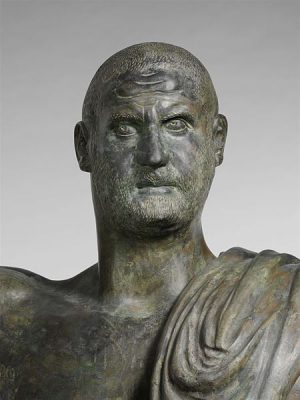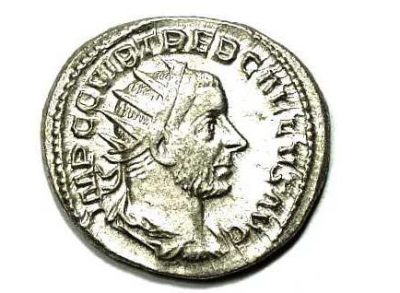Chapters
| Name | Gaius Vibius Trebonianus Gallus |
|---|---|
| Ruled as | |
| Reign | 251 – 253 CE |
| Born | 206 CE |
| Died | August 253 CE |
Trebonianus Gallus was born in 206 CE. in Perugia, Italy as Gaius Vibius Trebonianus Gallus. His family had Etruscan roots, and some family members reached senatorial status. Trebonianus had two children from his marriage to his wife – Afinia Gemina Baebiana: a son of Gaius Vibius Volusianus (later Emperor Volusian) and a daughter of Vibia Galla.
His political career was an exemplary cursus honourum. Gallus held both political and military positions. In 250 CE became governor of the Roman province of Moesia Superior after having previously served as consul. The fact that he was elected the governor of this province proves the trust that Emperor Trajan Decius placed in him. In Moesia, Gallus distinguished himself militarily. His active and decisive leadership made it possible to push back the raids of Gothic tribes from across the Danube. Gallus became popular in the army due to his approach to soldiers and image: military hairstyle, powerful and awe-inspiring body posture.
Reign
In June 251 CE, Trajan Decius and his son Herennius Decius (Co-Regent) died at the Battle of Abrittus. The clash (also known as the Battle of the Forum of Terebronia) took place near what is today Razgrad in Bulgaria. According to Greek orator and historian Dexippos, the failure of Trajan Decius was largely due to the actions of Gallus, who collaborated with the Goths. As soon as Gallus’ armies found out about the death of the emperor, they immediately proclaimed him the new emperor, despite the fact that Decius’s younger son, Hostilian, was still alive. The fact that Gallus was in good contact with the imperial family and that his election as emperor was proposed by the soldiers prove to a large extent that Dexippos’ claims are untrue. Gallus agreed to take power, and his next step was to appoint Hostilian as co-ruler – possibly to avoid another civil war. Uncertain about his position in Rome, Gallus decided to stabilize the situation on the Gothic front and make peace with the enemy. According to this agreement, the Goths could leave the Roman lands without any obstacles, taking with them all the gains and prisoners. Moreover, it was agreed that Rome would pay them an annual tribute.
Gallus, having reached the capital, was recognized as ruler by the Senate, and his son was proclaimed Caesar. On June 24, 251 CE Trajan Decius was deified, and his son Hostilian died on July 15 of the same year of (probably) plague. Gallus, wanting to prove his competence and gain popularity among citizens, was ordered to provide the victims of the epidemic with a dignified burial. Gallus was generally received positively by the Senate and the people of Rome, mainly because of his Italian origin.
Gallus was also probably responsible for the outbreak of unorganized persecution against Christians. The only evidence, however, is the imprisonment of Pope Cornelius in 252 CE.
Like Gallus’ predecessors, he, too, had no easy and pleasant rule. In the east, the noble of Antioch – Mariades, revolted imperial power, destroyed Syria and Cappadocia, and fled to Persia. Gallus ordered an attack on Persia, but the Persian ruler Shapur I invaded Armenia in advance and destroyed a large Roman army at Barbalissos in 253 CE. Shapur then invaded the Syrian provinces, where he captured all legionary positions and plundered the cities (including Antioch), with no response from the Romans. The Persian invasion was repeated the following year, but the appearance of Uranius Antoninus (hereditary priest of Aphrodite and El Gabala in Emesa, Syria, also known as Sampsiceramus) in 253 CE forced the Persians to leave Roman lands. After the victorious battles, Uranius proclaimed himself emperor.
On the Danube, in turn, the Scythian tribes repeated attacks on Roman territory, despite the agreement of 251 CE. The Scythians invaded the province of Asia Minor from the sea, burned down the Temple of Artemis in Ephesus, and returned to their lands with their loot. Raids also took place in Lower Moesia in 253 CE, but eventually the governor of Upper Moesia and Pannonia, Emilian, took the initiative and defeated the enemy in battle.
Death
Over time, continuous defeats on the fronts and general discontent among the legionaries led to Emilian being proclaimed emperor. Gallus, threatened by the usurper, began to prepare for the start. He summoned several legions from Gaul to Rome under the command of the later Emperor Valerian I. Before that, however, Emilian sent troops to Italy and captured Gallus at Interdamna (the present-day city of Terni).
What exactly happened it is uncertain. Later sources indicate that after the defeat, Gallus and his son Volusian died at the hands of their own soldiers, or after their legionaries passed to the usurper’s side, they died on the orders of Emilian. Regardless of what exactly the last days of the father and son’s lives were, it is certain that they both died in August 252 CE.







